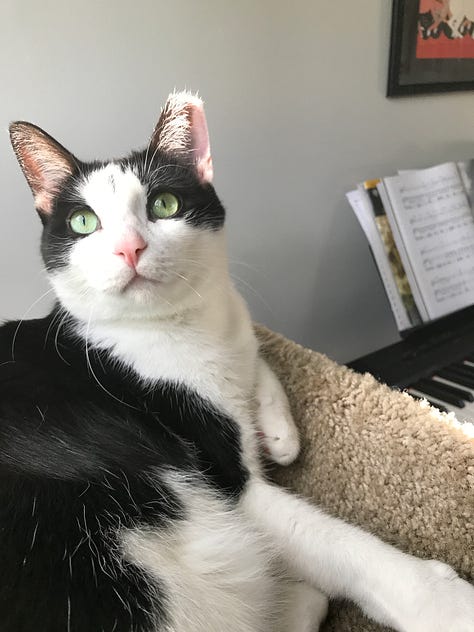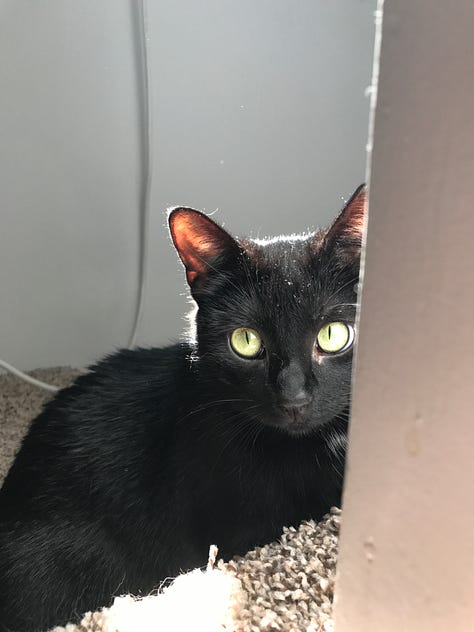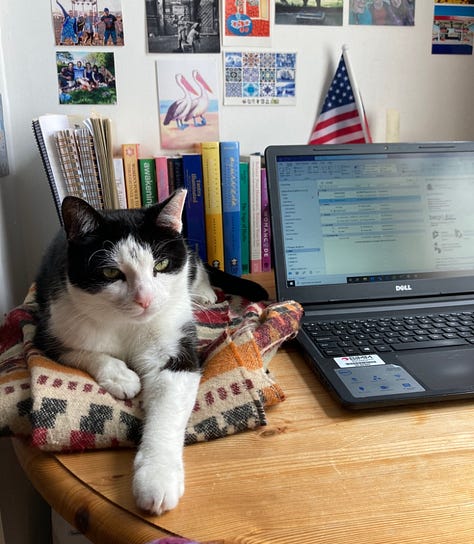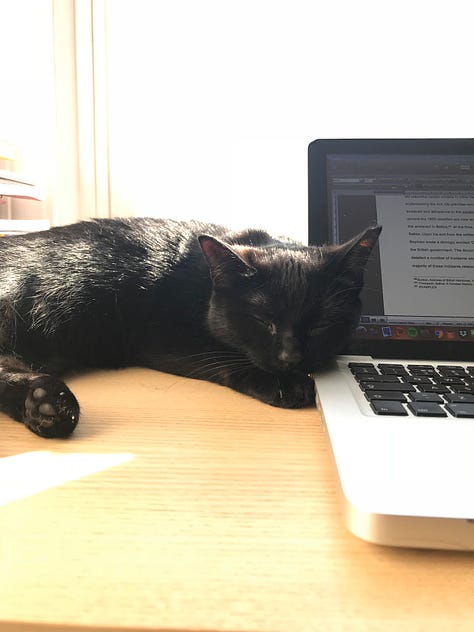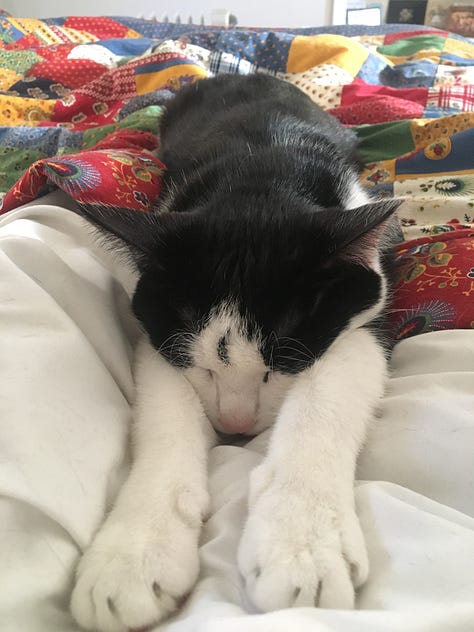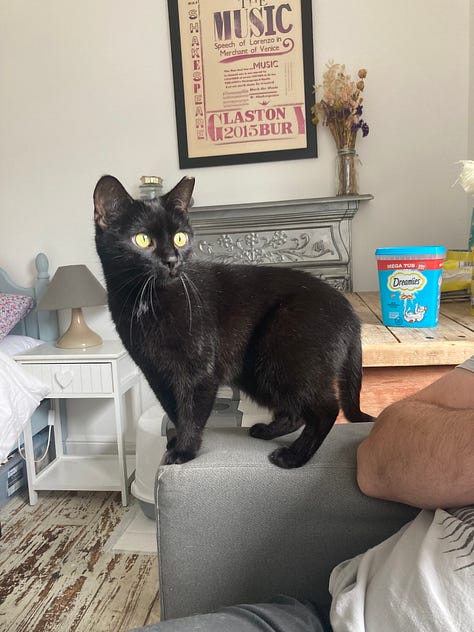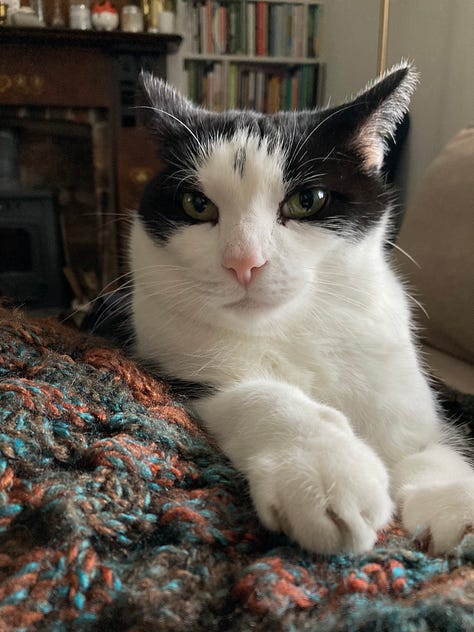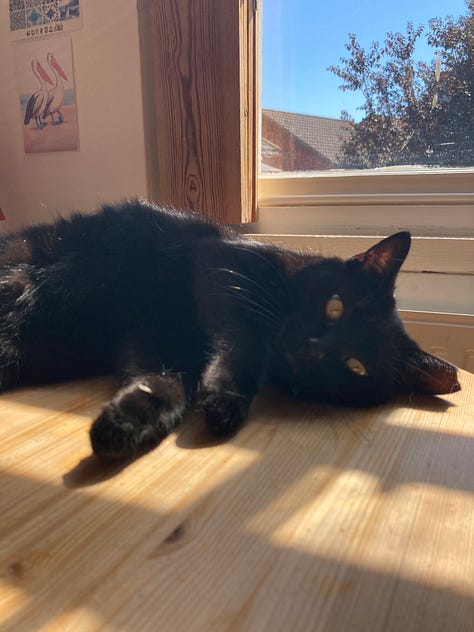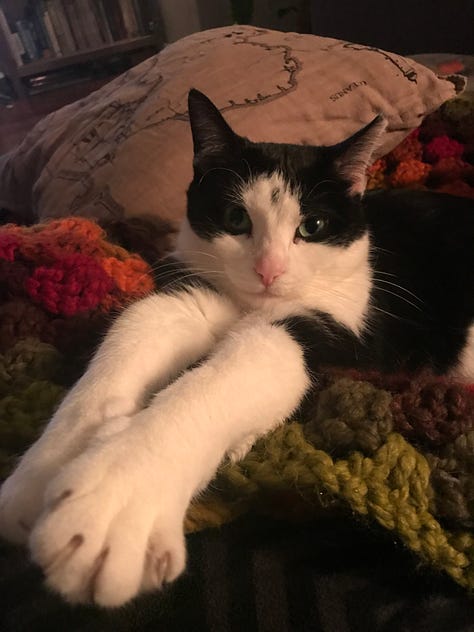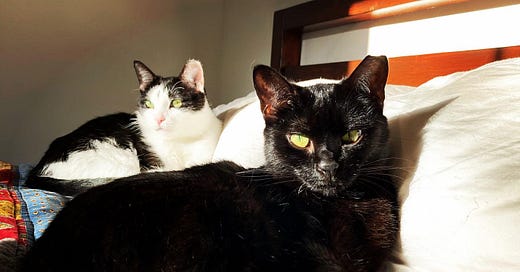The tale of two well-travelled cats
Or how love is always transforming and changing before our eyes
Yesterday I read a beautiful piece by Suleika Jordan about the death of her beloved dog, Oscar, and how this event marked a turning point in her own health journey. The piece was followed by a guest contribution from one of my favourites, Susan Cain, the author of Quiet and Bittersweet. It’s an extract from Bittersweet, centred around a story about Franz Kafka and love, and the way that it morphs and changes over our lifetimes. She writes:
"Everything that you love, you will eventually lose. But in the end, love will return in a different form."
I remember reading this section in Bittersweet just after my first miscarriage. At that time, I was angry and sad, and I couldn’t quite connect with what she was saying. Yet in time, it has proven itself to be true. I’ve experienced a lot of pain and change and loss, and I’ve found beauty and connection in many unexpected places and forms.
Susan also included a prompt, which has been on my mind ever since I read it. I love a good prompt and have found them to be helpful for folks like me who are trying to create a more regular writing practice. Susan’s prompt was to: “write about a time when something you loved and lost returned in a different form.”
I initially felt stumped by this prompt, so focused have I been on loss in recent years. Yet sparked by the subject of Suleika’s original post (Oscar the dog), my mind soon turned towards my beloved cats: two creatures that have taught me so much about love. What I have loved and lost, and what has since returned to me, isn’t as specific as Sulekia’s experience of Oscar’s death coinciding with the slow restoration of her health, but I could see that there were parallels with the way that these cats had appeared in my life right at the moment when everything I’d previously known was being dismantled.
In 2014, we moved to Detroit for work, and straight away felt at ease in the music school that would become our home for the next five years. Alongside the wonderful people and talented students and general air of excitement in the building, I was also delighted to find out that the alleyway out the back was home to a motley crew of cats. My friends and I would huddle in the doorway together, smoking; watching them tentatively inch forward to feed from bowls of Friskies and milk.
As time went on, their confidence grew, and soon it was normal to see them appear as soon as they heard the slam of the back door. Even so, they were all pretty timid, except for one - Raja - who we’d appointed the boss. We always wondered if he’d been domesticated before and had escaped or been dumped. Unlike the others, he would happily approach us, sniff our hands, and let us stroke him. We’d watch them cluster together under the dumpster, or on the drain covers getting warmth from the rising steam, or catch glimpses of them through a broken window of the abandoned building in which they’d made their home.
I became very attached to these cats - Raj in particular - and threw myself into the group project of their care and upkeep. Life in Detroit was a total whirlwind, those first few months in particular. Everything we knew was being readjusted and remade. I loved it, and felt connected to my new friends and work, but I was also adrift and homesick. A lot of America was jarring and unexpected to me, but there was so much going on, it didn’t always register. In the swirl of new experiences, the cats became an anchor: feeding them each day installed a sense of routine in an often spontaneous existence, where there were always new places to visit, things to see, things to do.
As time went on, things began to settle, but the cats remained part of our lives. Within a year, the numbers had grown, peaking at an impressive 19 at one point. Ever the organiser, I made a spreadsheet of their names, with notes and an identifying photo for each, There were so many, but over time we got to know their personalities and quirks. Among others, there was an elusive grey cat named Grandpa, who we rarely saw. She turned out to be female, but the name stuck. Grandpa was mother to a gorgeous trio of kittens, one affectionately known as Dame Judi Dench due to her silver white fur. There was Nalo and Tinker and Tailor, black and white boys who were clearly Raja’s sons. There was a cross-eyed dark grey cat called Braveheart, who went missing; and a pretty but skittish tabby who we referred to as ‘Little Brown Cat,’ a temporary name that ended up sticking.
We had so many funny incidents. Once, we watched Raj bring down a huge pigeon, later leaving a bloodied wing at the back door as an offering. We laughed as a little black kitten, Scrappy, overturned multiple bowls of food in her rush to eat, barging much bigger cats out of her way in the process. There was the time when Simba, an adventurous young cat, got trapped on a fire escape, necessitating the sweet-talking of some local builders for the loan of their ladder. We conducted a daring rescue and vet visit for Simba’s brother, Nalo, after he was attacked by a rogue possum. We scattered cat nip all over the alley and watched them roll around in the dust as if they’d been drugged.
Later, as the kitten population expanded, we attempted to TNR (Trap/Neuter/Return) as many cats as we could. During that period, we spent so much time in the alley, huddled under blankets as snow fell, attempting to coax the cats out and into the special cages we’d put down. It was so fucking cold.
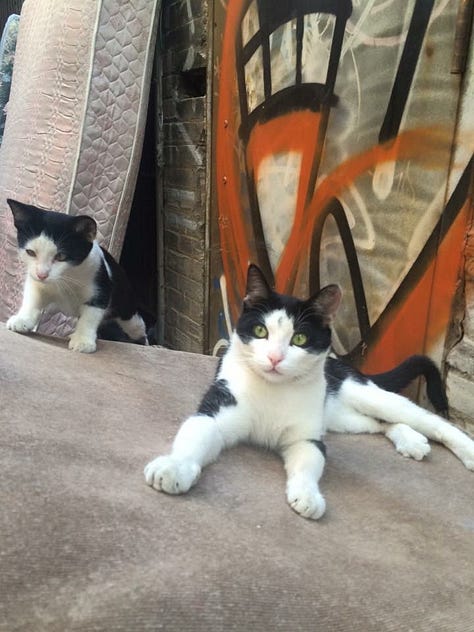
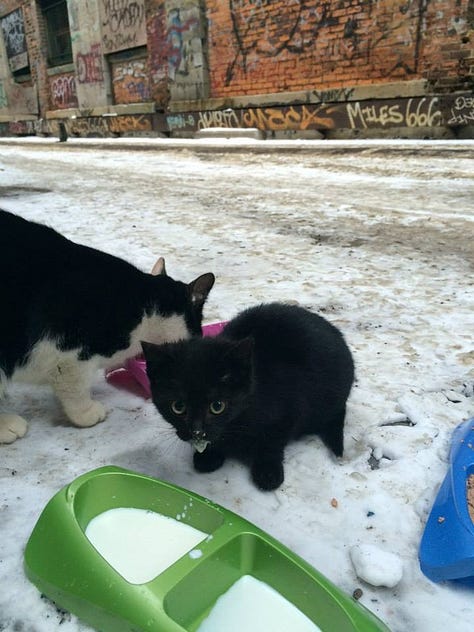
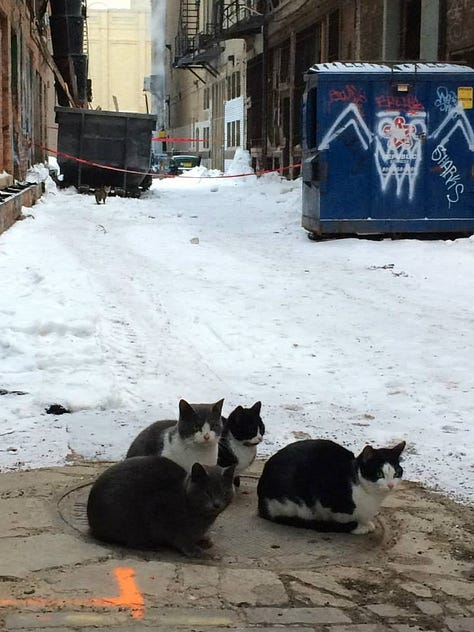
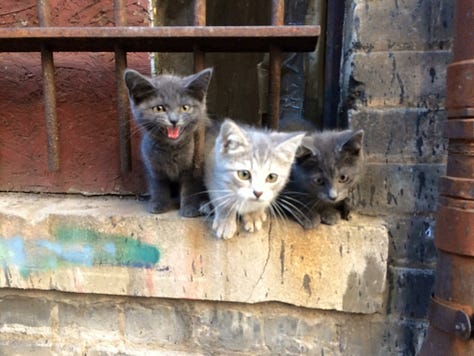
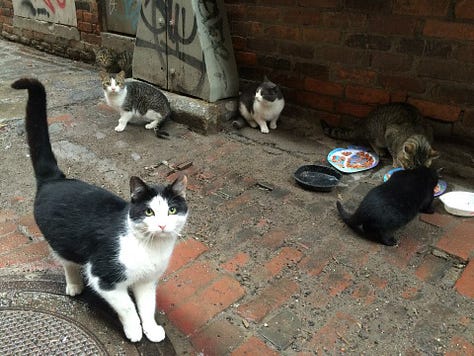
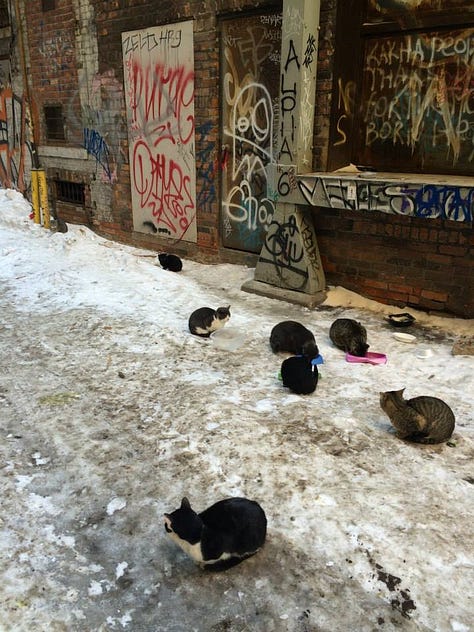
And then, Spring 2016, the turning point. We discovered that the abandoned building the cats lived in was being gutted and renovated. We made plans to adopt as many as we could. By that point, there were 13 or 14 cats that we saw regularly, and of those, we managed to rehome 9. I’ll always remember sitting on the runway in New York after a weekend away, about to take off, and taking a call from my friend, asking if I wanted to have Raja. I turned to Karl and, seeing the love and desperation in my eyes, he agreed: we could take him.
The next few months were tumultuous. Raj was a delight during the day but found it hard to settle at night, and would often keep us awake for hours crying. He peed in Karl’s shoes and scratched our couch to bits. I was wracked with guilt for taking him away from his cat tribe, and wondered if we’d done the right thing. But in the summer we moved from Detroit to Ferndale, just outside the city limits. Raj came too and was immediately happier in a bigger house. That summer, we ended up adopting another one of our alley cat friends: the little black cat, Scrappy. A colleague had taken her, but was having trouble getting Scraps to integrate with the cats she already had, so we happily volunteered.
The rest is history. The cats stayed with us throughout our time in Detroit, and when it was time to move back to the UK, were shipped across the sea on a Delta flight. They went to a cattery for a month, before moving with us to Seaford, where we’ve spent the past few years, and then last August, after another stay in the cattery, travelled with us in the van to Wales. They’ve quickly settled here, and aside from some big bastard local felines to fend off in the garden, seem to be loving their new home.
They are such a funny pair. Little and Large, or as we like to call them: Tiny and Big.
Raj is the big one: a real alpha - in looks and personality. He is a very handsome chap. He has a regal air. He loves lying straight out with his spotless white paws extended. He enjoys being fussed over, held, and sitting on our laps, but only on his terms. He aggressively goes after whatever it is that he wants, be it his dinner, birds, or the tiny cat. He has an insitent meow and the loudest, deepest purr I’ve ever heard.
And then at the other end of the scale is Scrappy, the runt of the litter. She’s so much smaller. Sometimes she curls up in such a tight ball that she looks more like a door mouse than a cat. She’s got velvety black fur and a little white tuft on her chest. There’s something wrong with her eyes, so her head is always wobbling, struggling to focus, especially when she looks into the distance. Her purrs sound like a cooing pigeon, her meows like a baby lamb. She’s affectionate and loves rolling around in the sun, but god help you if you try to pick her up.
The two of them have a love/hate relationship. I’m just as likely to find them cuddled up and grooming each other, as I am breaking up a fight. We often joke that Raj is her dad, but of course we’ll never know.
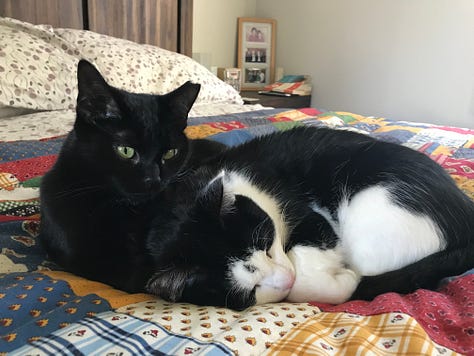
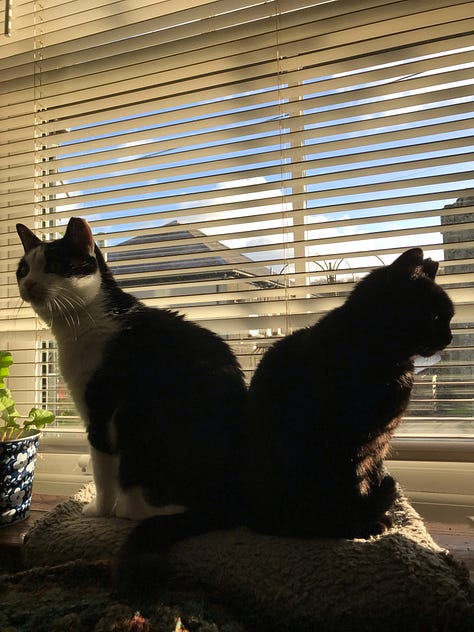
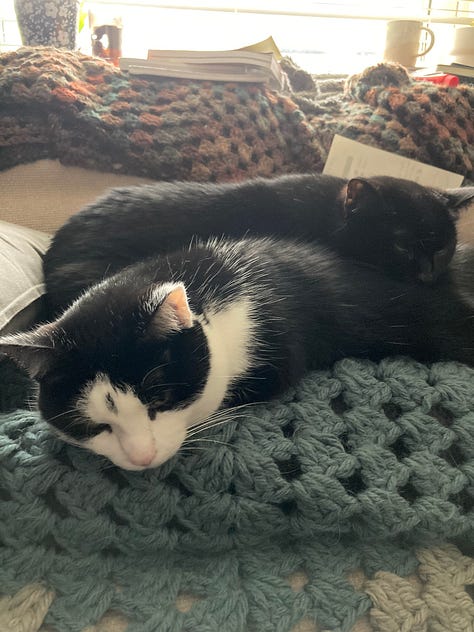
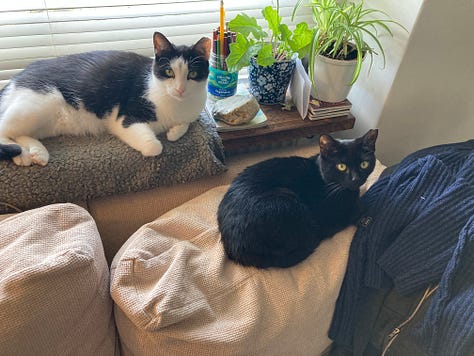
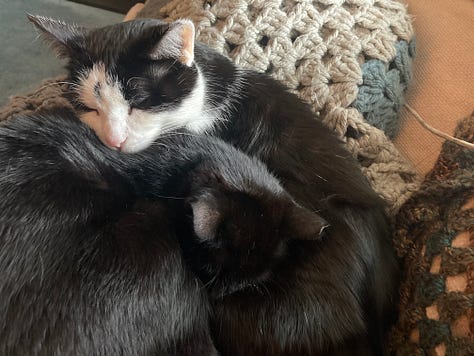
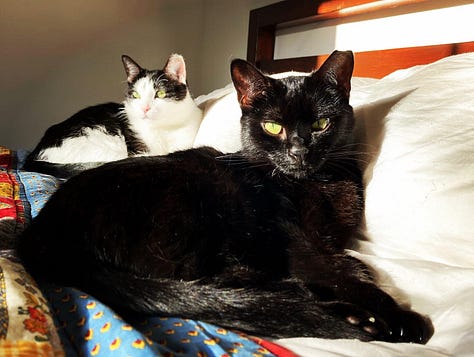
In the aforementioned post, Susan reminds us that even though love will always return in a different form, it’s important to acknowledge what has been lost: “the specific places or people or dreams” that can’t be found again once they’ve gone. When I think about what had to be lost in order for Detroit to happen, I think of the few years between us getting married and moving away. It feels like a different world now. Those years will forever exist in a golden bubble in my mind.
I had just turned 30 and was starting to shake off some of the anxiety that had plagued the latter half of my twenties. We lived in the centre of Brighton, with all our close friends a short walk away. We had disposable income. We had very little responsibility. We spent our time going on trips or to festivals and hanging out with our friends. I didn’t care about my job, and I was plugging away at a PhD that wasn’t right for me, but everything else seemed so effortless, it was easy enough to push those things down. I’d discovered Buddhism, and meditation was changing the way I thought about the world. I’d started to write, I’d completed the Brighton marathon, and we’d travelled to Nepal. Excuse the cliché, but life really did feel sweet.
It was right at that moment, where I was the most settled and secure I’d ever been, that we took the decision to move to Detroit; a decision that should have been difficult, but was in fact one of the easiest things we’d ever done. It didn’t make sense on paper, but it did in our hearts, and that’s what we followed.
When we moved, our world was turned upside down. I lost so much of that old life by moving to America, but I also gained unimaginable things - including the cats. Looking back now, I know it’s something I had to do. It blew my world open in the best possible way. I learned that hard life lesson: that in order for something to live, something else has to die. I had to compost my sweet, secure, easy life, in order to find out what was on the other side. I think that process is still happening all these years later.
Very occasionally I wonder what life would have been like if we’d not moved to Detroit. I wonder if we may have tried to start a family earlier, wonder whether it would have happened. But these thoughts are rare, and fleeting. I know that in moving away, I have sacrificed time with my family, with my loved ones. I know that I’ve missed celebrating milestones: the births of babies and weddings. I know we were away for a good chunk of the last few years of my mother-in-law’s life. I know that I’ve fundamentally changed my relationship with where I grew up, the places I choose to call home.
But I also know that I feel more at home in myself than I ever have, more connected to the important people in my life (even though we are still physically separate), and more in touch with how I want to live. Karl and I are finally doing something we’ve talked about for the majority of our 18-year relationship. I’m not sure if we would have got here, to Wales, if we hadn’t been to America. And, of course, we have two amazing cats too!
Since moving back to the UK, my bond with them has deepened. They came into my life at a particular moment, and helped soften our transition to America, but since then, they’ve continued to shepherd me through life. In Detroit, we worked in the office all day, but back on UK soil and as the pandemic kicked in, we opted for remote working meaning we got to hang out with them all the time. Later, after my first miscarriage, I withdrew from the world, but held them closer than I ever had - they gave me so much comfort during that time. Some weeks I’d go days without talking to anyone except Karl, but it would be ok, because I’d talk to the cats. They’d always be around, sitting on my desk as I worked, or curled up on my lap. Crawling into bed with me on my dark days. Perching on my knees as I read in bed. Karl and I have always regretted letting them sleep on our bed, as they inevitably disturb us throughout the night, but it’s gone too far now; we don’t have the heart to shut them out. And besides, dozing off at night to the sound of stereo purring has to be one of my most favourite things in the world (even if that delightful picture is ruined somewhat by an almost clockwork wake-up call from Raj between 4.30 and 5am every day). It’s somewhat disconcerting to realise that the entire rhythm of our days is determined by this animal, but he brings me so much joy that I’ll forgive him every time.
I find it hard to put into words how much I love them. They have taught me so much about presence and resilience and affection. Sometimes I look at them and marvel at their life to date. “You used to live in a bin!” I say. They never leave me alone. Right now, Raj is sitting on my feet; Scrappy is to my left, slowly kneading the blanket covering my legs, purring all the while. I love that they’re from Detroit. All the time they’re with me, I’ve got a real life, living thread connecting me back to our time in America, and that moment of bravery, where we jumped in with both feet and said yes. It’s helpful to remember that in moments of fear or doubt or regret, that there’s aways magic, surprise and delight to be found outside of our comfort zones.
America gave us so much magic, but right up there at the top of the list are these two cats. Raj and Scraps - I’ll love you forever.
